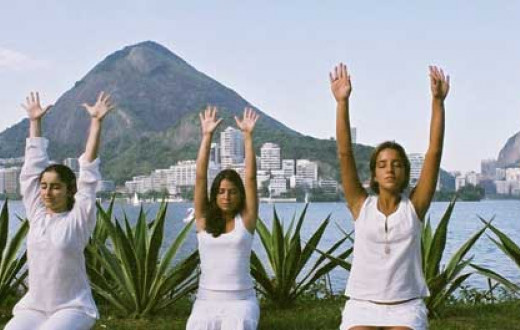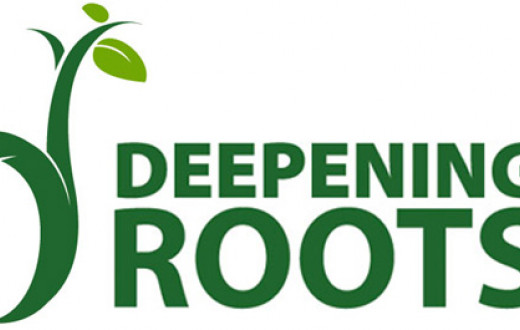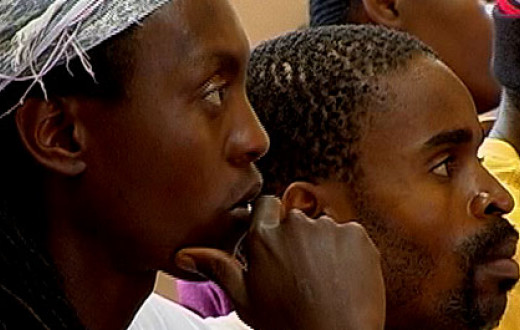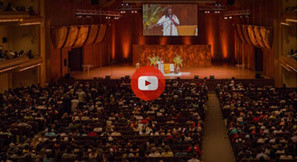Sat, 18/04/2009 Turkey
‘Life moves with commitment, not feelings’
Bangalore, India, April 18 (Saturday), 8:50 pm: Seated in the amphitheatre for satsang this evening, Gurudev’s seat was beautifully outlined against the backdrop of the lotus-shaped Vishalakshi Mantap. As the sounds of the bhajans rang through the open sky, it generated an atmosphere of high energy. People in the audience danced, clapped, and meditated together.
The people of West Bengal are suffering under the CPI government and their ideology since 30 years, it seems to be unending. Can we expect a change at all and how?
Sri Sri Ravi Shankar:
Change can happen by educating people. People like you (points to the crowd) do padayatras (walkathons) and educate people. West Bengal is far behind. There’s little industry and business, it has obsolete ideology. Make people aware.
Communist China and Russia have changed their course. But in India, it doesn’t change because of lack of awareness. So, create awareness and meditate. Nothing is impossible. If something is impossible, then we can do it!
Communist China and Russia have changed their course. But in India, it doesn’t change because of lack of awareness. So, create awareness and meditate. Nothing is impossible. If something is impossible, then we can do it!
Which limb of Asthanga yoga does Sudarshan Kriya belong to?
Sri Sri Ravi Shankar:
It does not belong to any particular limb of yoga, it is a culmination of all the paths.
Everything comes together in the Sudarshan Kriya - meditation, yoga asanas and dharana.
Everything comes together in the Sudarshan Kriya - meditation, yoga asanas and dharana.
Are the customs and rituals of religions conducive to spiritual growth or are they obstacles?
Sri Sri Ravi Shankar:
A vehicle is kept to the left in India. In the United States of America, cars keep to the right. Customs and rituals are there to guide society, steering society from going right or left.
They are made according to the time and the country. For instance, men wear unstitched clothes for a puja in South India. In North India, people wear coats. Perhaps, this is because the weather is cold there. When Muslim males go to Mecca for Haj, they have to wear unstitched clothes.
Yet, these customs and rituals are neither conducive nor act as obstacles on the path to God.
There are many customs when it comes to marriages. A coconut and a mirror are placed on a plate, when welcoming the in-laws in South India. It is as though to say: ‘Enter with a smile. See your face and feel complete. We are feeling complete here.’ When you see yourself in the mirror in the morning, you smile. You don’t frown when you see yourself.
People in Maharashtra welcome the in-laws with a betel nut and a gold coin on their head. This gesture says: ‘Your thoughts should shine like gold.’ This is an auspicious gesture.
There are other rituals in Bihar and Bengal. These customs from different parts of India should be studied thoroughly. Someone should take up this project.
In Kerala, a nirapara is kept at the entrance of a house to welcome people. It is a vessel filled with grains, flowers from the coconut tree and a diya (lamp). This custom signifies that the house which is being entered is full, there is happiness. It is a sign of prosperity.
Similarly, people gift each other chocolate eggs for Easter in Europe. It is a symbol of prosperity and progeny.
In India, people fast when going on a pilgrimage – say, to Shabri Mala, Vaishno Devi or Tirupati. Christians and Muslims in Ethiopia, fast too. They don’t eat vegetables or dairy products for some period of the year. These are rituals and customs. There must be some reason.
They are made according to the time and the country. For instance, men wear unstitched clothes for a puja in South India. In North India, people wear coats. Perhaps, this is because the weather is cold there. When Muslim males go to Mecca for Haj, they have to wear unstitched clothes.
Yet, these customs and rituals are neither conducive nor act as obstacles on the path to God.
There are many customs when it comes to marriages. A coconut and a mirror are placed on a plate, when welcoming the in-laws in South India. It is as though to say: ‘Enter with a smile. See your face and feel complete. We are feeling complete here.’ When you see yourself in the mirror in the morning, you smile. You don’t frown when you see yourself.
People in Maharashtra welcome the in-laws with a betel nut and a gold coin on their head. This gesture says: ‘Your thoughts should shine like gold.’ This is an auspicious gesture.
There are other rituals in Bihar and Bengal. These customs from different parts of India should be studied thoroughly. Someone should take up this project.
In Kerala, a nirapara is kept at the entrance of a house to welcome people. It is a vessel filled with grains, flowers from the coconut tree and a diya (lamp). This custom signifies that the house which is being entered is full, there is happiness. It is a sign of prosperity.
Similarly, people gift each other chocolate eggs for Easter in Europe. It is a symbol of prosperity and progeny.
In India, people fast when going on a pilgrimage – say, to Shabri Mala, Vaishno Devi or Tirupati. Christians and Muslims in Ethiopia, fast too. They don’t eat vegetables or dairy products for some period of the year. These are rituals and customs. There must be some reason.
Can I take a sankalpa for a change in someone else’s behavior?
Sri Sri Ravi Shankar:
Do it, take it. Bless them to behave better. When you want to bless someone because their behavior hurts you, it doesn’t work. When you want to bless them because their behavior hurts them, that would work. That is compassion. Say: May you behave better, so that you can be happier.
Meditation gives me a high. If I discontinue for a few days and resume, I get a greater high. I fear that I will lose this high.
Sri Sri Ravi Shankar:
I think you have too much free time. If you’re engaging yourself in some creative activity, then where is the time to feel bad?
Anand Yog means communion with the Divine, which brings bliss.
Anand Bhog is doing things for enjoyment. It is not the best.
If we worry about whether we are high or low, then we get trapped in a self-centred cycle which may lead to depression. Do some seva. Do your practice. There are so many people who need you. Do some job.
If there is nothing creative to do, then you will feel like this.
The world doesn’t care – it shouldn’t care.
You stand up, wake up and say: ‘My life is going to move with commitment, not with feelings.’
Feelings are unpredictable. You can predict that the pigeons in the hall (pointing to Vishalakshi Mantap) will remain there, but you cannot predict your mind.
Anand Yog means communion with the Divine, which brings bliss.
Anand Bhog is doing things for enjoyment. It is not the best.
If we worry about whether we are high or low, then we get trapped in a self-centred cycle which may lead to depression. Do some seva. Do your practice. There are so many people who need you. Do some job.
If there is nothing creative to do, then you will feel like this.
The world doesn’t care – it shouldn’t care.
You stand up, wake up and say: ‘My life is going to move with commitment, not with feelings.’
Feelings are unpredictable. You can predict that the pigeons in the hall (pointing to Vishalakshi Mantap) will remain there, but you cannot predict your mind.
My father is an astrologer. Whatever he says comes true. He told me that I will get mental disorders after six years. I’m scared. Please help me.
Sri Sri Ravi Shankar:
Remind your father that there is upaya (remedy) also. There is no astrology without upaya. The mal-effects of astrology can be countered with upaya. The remedy is meditation and satsang. Sit and chant: Om Namo Shivaya. It takes care of all the mal-effects. All the five elements and the whole life force is present in Om Namo Shivaya. Don’t worry about it. On this path, you should drop those concerns and worries.
































